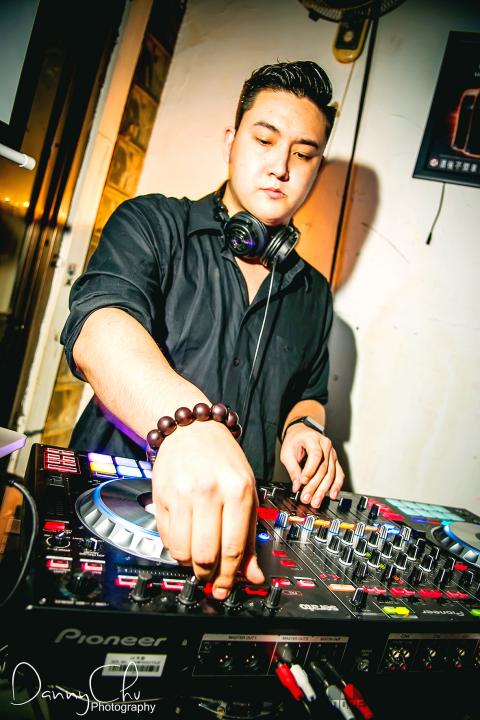Before DJ Bl3nd (real name withheld) played at Spring Break on the Beach in Kenting in April, I have to admit that I was a bit skeptical about his set. This is a DJ who always wears a Chucky from Child’s Play mask and never reveals his true identity. Many DJs have done this before, most notably Daft Punk. Also, Bl3nd became famous because he banged his head over and over to hard-style electronic music in YouTube videos, which eventually racked up millions of views. In his live shows, he sprays crowds with champagne, CO2 guns and whipped cream. Hanging out in front of the turntables more than behind the turntables was definitely popularized by Steve Aoki in the past few years.
But when the show started, I immediately understood why he was picked to headline the music festival on opening night. The crowd went silent, and then was instantly whipped into a frenzy by the first big drop. For the next 90 minutes, Bl3nd showboated around the stage like a consummate professional carefully orchestrating the controlled chaos. The music didn’t matter that much because the only thing the crowd cared about was getting turned up. Bl3nd returns to Taiwan tomorrow to play at Muse Kaohsiung.
DJ Apesh!t (real name Alex Smale), a resident DJ at Muse Kaohsiung, will not be playing with Bl3nd tomorrow, but will be his handler instead — this means making sure Bl3nd gets from the airport to the hotel, makes it to the club on time and experiences a little bit of Taiwan’s hospitality.

Photo courtesy of Alex Smale
Raised in Shanghai before moving to Taiwan six years ago, Apesh!t lived the international kid’s dream lifestyle in China — which meant he had no trouble sneaking into bars and clubs before he was legally allowed to enter. This is where he got his first taste of banging beats from DJs like Designer Drugs, Gaslamp Killer and Boys Noize. Eight years ago, Apesh!t caught the DJ bug. He started playing small parties and graduated to being a resident at one of the biggest clubs in Kaohsiung. His nom de guerre is Apesh!t because everyone goes bananas when he plays his signature high energy, bass-heavy music.
Apesh!t was asked by the bosses at Muse Kaohsiung whether he thought Bl3nd or DJ A-Trak, one of the world’s best turntablists and producers, would be a better fit for the crowd.
“I would have loved to have A-Trak come over, but I thought DJ Bl3nd was the better choice because I feel he’s someone who Taiwanese fans would most relate to,” Apesh!t said.
“He’s also been known to project lots of energy on stage, and customers really feed on that energy to have a good time. That, and CO2 guns, champagne and whipped cream.”
■ DJ Bl3nd plays tomorrow from 10pm to 4am at Muse Kaohsiung, 10, Siwei 4th Rd, Kaohsiung City, (高雄市四維四路10號). Admission is NT$600 for ladies and NT$1,200 for men. This includes an open bar all night

May 26 to June 1 When the Qing Dynasty first took control over many parts of Taiwan in 1684, it roughly continued the Kingdom of Tungning’s administrative borders (see below), setting up one prefecture and three counties. The actual area of control covered today’s Chiayi, Tainan and Kaohsiung. The administrative center was in Taiwan Prefecture, in today’s Tainan. But as Han settlement expanded and due to rebellions and other international incidents, the administrative units became more complex. By the time Taiwan became a province of the Qing in 1887, there were three prefectures, eleven counties, three subprefectures and one directly-administered prefecture, with

It’s an enormous dome of colorful glass, something between the Sistine Chapel and a Marc Chagall fresco. And yet, it’s just a subway station. Formosa Boulevard is the heart of Kaohsiung’s mass transit system. In metro terms, it’s modest: the only transfer station in a network with just two lines. But it’s a landmark nonetheless: a civic space that serves as much more than a point of transit. On a hot Sunday, the corridors and vast halls are filled with a market selling everything from second-hand clothes to toys and house decorations. It’s just one of the many events the station hosts,

Among Thailand’s Chinese Nationalist Party (KMT) villages, a certain rivalry exists between Arunothai, the largest of these villages, and Mae Salong, which is currently the most prosperous. Historically, the rivalry stems from a split in KMT military factions in the early 1960s, which divided command and opium territories after Chiang Kai-shek (蔣介石) cut off open support in 1961 due to international pressure (see part two, “The KMT opium lords of the Golden Triangle,” on May 20). But today this rivalry manifests as a different kind of split, with Arunothai leading a pro-China faction and Mae Salong staunchly aligned to Taiwan.

Two moves show Taichung Mayor Lu Shiow-yen (盧秀燕) is gunning for Chinese Nationalist Party (KMT) party chair and the 2028 presidential election. Technically, these are not yet “officially” official, but by the rules of Taiwan politics, she is now on the dance floor. Earlier this month Lu confirmed in an interview in Japan’s Nikkei that she was considering running for KMT chair. This is not new news, but according to reports from her camp she previously was still considering the case for and against running. By choosing a respected, international news outlet, she declared it to the world. While the outside world